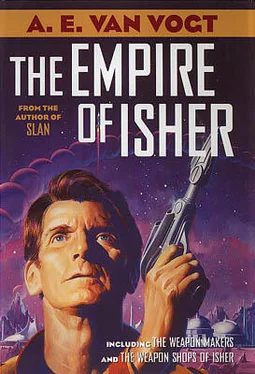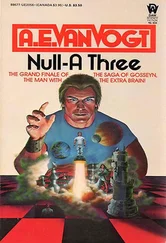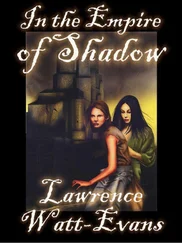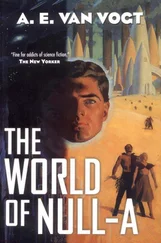A. E. Van Vogt
THE EMPIRE OF ISHER
THE WEAPON SHOPS OF ISHER
1951
MAGICIAN BELIEVED TO
HAVE HYPNOTIZED CROWD
June 11, 1951—Police and newspapermen believe that Middle City will shortly be advertised as the next stopping place of a master magician and they are prepared to extend him a hearty welcome if he will condescend to explain exactly how he fooled hundreds of people into believing they saw a strange building, apparently a kind of gun-shop.
The building seemed to appear on the space formerly, and still, occupied by Aunt Sally’s Lunch and Patterson Tailors. Only employees were inside the two aforementioned shops, and none noticed any untoward event. A large, brightly shining sign featured the front of the gunshop, which had been so miraculously conjured out of nothingness; and the sign constituted the first evidence that the entire scene was nothing but a masterly illusion. For from whichever angle one gazed at it, one seemed to be staring straight at the words, which read:
FINE WEAPONS
THE RIGHT TO BUY WEAPONS
IS THE RIGHT TO BE FREE
The window display was made up of an assortment of rather curiously shaped guns, rifles as well as small arms; and a glowing sign in the window stated:
THE FINEST ENERGY WEAPONS
IN THE KNOWN UNIVERSE
Inspector Clayton of the Investigation Branch attempted to enter the shop, but the door seemed to be locked. A few moments later, C. J. (Chris) McAllister, reporter of the Gazette-Bulletin, tried the door, found that it opened, and entered.
Inspector Clayton attempted to follow him, but discovered that the door was again locked. It is believed that McAllister went through to the back, as several spectators reported seeing him. Immediately after his reappearance, the strange building vanished as abruptly as it had appeared.
Police state they are baffled as to how the master magician created so detailed an illusion for so long a period before so large a crowd. They are prepared to recommend his show, when it comes, without reservations.
(Author’s Note: The foregoing account did not mention that the police, dissatisfied with the affair, attempted to contact McAllister for a further interview, but were unable to locate him. Weeks have passed; and he has still not been found. What did happen to McAllister from the instant that he found the door of the gunshop unlocked?)
There was a curious quality about the gunshop door. It was not so much that it opened at his first touch as that, when he pulled, it came away like a weightless thing. McAllister had the impression that the knob had freed itself into his palm.
He stood very still, startled. The thought that came finally had to do with Inspector Clayton who, a minute earlier, had found the door locked. The thought was like a signal. From behind him boomed the voice of the inspector:
“Ah, McAllister, I’ll handle this now.”
It was dark inside the shop beyond the door, too dark to see anything, and somehow, his eyes wouldn’t accustom themselves to the intense gloom. Pure reporter’s instinct made him step forward toward the blackness that pressed from beyond the rectangle of door. Out of the corner of one eye, he saw Inspector Clayton’s hand reaching for the door handle that his own fingers had let go a moment before. And he knew instantly that if the inspector could prevent it, no reporter would get inside that building. His head was still turned, his gaze more on the police officer than on the darkness in front; and it was as he began another step forward that the remarkable thing happened.
The door handle would not allow Inspector Clayton to touch it. It twisted in some queer way, in some energy way, for it was still there, a strange, blurred shape. The door itself, without visible movement it was so swift, was suddenly touching McAllister’s heel. Light, almost weightless, was that touch; and then, before he could think or react to what had happened, the momentum of his forward movement had carried him inside. As he breasted the darkness, there was a sudden, agonized tensing along his nerves. Then the door shut tight, the brief, unexpected agony faded. Ahead was a brightly-lit shop; behind—were unbelievable things!
For McAllister, the moment that followed was one of blank impression. He stood, body twisted awkwardly, only vaguely conscious of the shop’s interior, but tremendously aware in the brief moment before he was interrupted of what lay beyond the transparent panels of the door through which he had just come.
There was no unyielding blackness anywhere, no Inspector Clayton, no muttering crowd of gaping spectators, no dingy row of shops across the way. It was not even the same street. There was no street. Instead, a peaceful park was visible. Beyond it, brilliant under a noon sun, was the skyline of a vast city. From behind him, a husky, musical, woman’s voice said:
“You will be wanting a gun?”
McAllister turned. The movement was automatic reaction to a sound. And because the affair was still like a dream, the city scene faded almost instantly; his mind focused on the young woman who was advancing slowly from the rear section of the store. Briefly, his thought wouldn’t come clear. A conviction that he ought to say something was tangled with first impressions of the girl’s appearance. She had a slender well-shaped body; her face was creased with a pleasant smile. She had brown eyes, and wavy brown hair. Her simple frock and sandals seemed so normal at first glance that he gave them no further thought. He was able to say:
“What I can’t understand is why the police officer, who tried to follow me, couldn’t get in. And where is he now?”
To his surprise, the girl’s smile became faintly apologetic: “We know that people consider it silly of us to keep harping on that ancient feud.” Her voice grew firmer. “We even know how clever the propaganda is that stresses the silliness of our stand. Meanwhile, we never allow any of her men in here. We continue to take our principles very seriously.”
She paused as if she expected comprehension from him. But McAllister saw from the slow puzzlement creeping into her eyes that his face must look as blank as the thoughts behind it. Her men! The girl had spoken the words as if she were referring to some personage, and in direct reply to his use of the word, police officer. That meant her men, whoever she was, were policemen; and they weren’t allowed in this gunshop. So the door was hostile, and wouldn’t admit them. An emptiness struck into McAllister’s mind, matching the hollowness that was beginning to afflict the pit of his stomach, a sense of unplumbed depths, the first staggering conviction that all was not as it should be. The girl was speaking in a sharper tone:
“You mean you know nothing of all this, that for generations the gunmaker’s guild has existed in this age of devastating energies as the common man’s only protection against enslavement? The right to buy guns—” She stopped, her narrowed eyes searching him; then: “Come to think of it, there’s something very peculiar about you. Your outlandish clothes— you’re not from the northern farm plains are you?”
He shook his head dumbly, more annoyed with his reactions every passing second. But he couldn’t help it. A tightness was growing in him now, becoming more unbearable instant by instant, as if somewhere a vital mainspring was being wound to the breaking point.
The young woman went on more swiftly: “And come to think of it, it is astounding that a policeman should have tried the door, and there was no alarm.”
Читать дальше











